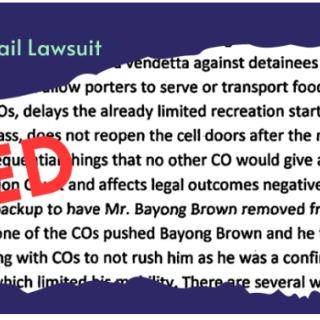Advertisement
On Friday, September 14th, the Ohio Supreme Court rejected the peoples’ arguments that the Franklin County Board of Elections (BOE) had violated the rights of the people to legislate directly by initiative and sided with the BOE to keep the Columbus Community Bill of Rights off the November ballot. The proposed ordinance, if enacted, would assert resident’s rights to clean water, air, and soil and ban oil & gas extraction infrastructure, particularly regarding radioactive, toxic waste disposals in the city of Columbus as a violation of those rights.
The court arbitrarily determined that the municipality and the people of Columbus do not have the same rights that the cities and people of Youngstown and Bowling Green have in placing initiatives on the ballot. After precedents set by the court’s own decisions for these cities, the Ohio high court reversed logic in Columbus and stated that municipalities do not have the rights to create new causes of action, based upon statements by a member of the Franklin County Board of Elections and reiterated by two citizen protesters.
The Franklin County BOE action and the Supreme Court decision rely on wording from House Bill 463, enacted in 2017, and a prior Youngstown decision from 2016. In dissent, Justice Fischer states that in the Youngstown decision, “I wrote an opinion concurring in judgement only in which I concluded that portions of H.B. 463 are unconstitutional and that certain pre-H.B. 463 decisions of this court had been decided in error and should be overruled.” In the Bowling Green decision, it was ruled that it was a violation of separation of powers for a BOE to “make substantive, pre-enactment legal evaluations … and is unconstitutional.”
Bill Lyons, co-organizer for CCBOR states, “By this decision Youngstown residents have more rights than the residents of Columbus because they get to vote for their Water Protection Bill of Rights in November, but the residents of Columbus do not. This is a gross miscarriage of justice.” He further adds that “What the court has ruled is that it is legal for the oil and gas industry to dump their toxic, radioactive waste in the Columbus watershed and illegal for the people of Columbus to protect themselves from the harms of those corporations. How long will the people accept being poisoned by their own government and their corporate masters?”
Co-organizer Greg pace states, “The myths of democracy that we live under today were actually developed right after the Revolution by white, wealthy men. The myth is that all people have the same right to govern and that the people all have a voice in our democracy. What we are witnessing today in Columbus and around Ohio is that myth being exposed. The “rights” of corporations and property have been elevated by our three branches of government, which are controlled by the 1% elite minority, above that of the people to protect their health, safety and welfare.” Pace added “People need to see very clearly with this decision that the people cannot ‘alter or reform’ an unjust and corrupt government, when that government has complete control over them doing so. In other words, the system is not broken, it is working exactly as the founders and the elite 1% minority have intended for it to work all along.”
The Columbus Community Bill of Rights, an initiative by the people to protect their drinking water and environment, would enable citizens to directly address pollution and harm to their drinking water before the harm occurs. The community group poured many hours of sweat and sacrifice over an entire year to give the voters of Columbus a voice in passing this law. In a single coordinated effort by the government and the court, that voice was silenced.
The Columbus citizen group chose to work with the Community Environmental Legal Defense Fund (CELDF) to draft the initiative as a result of frustration felt by residents after years of inaction by the government. CELDF has partnered with communities across more than 10 states to enact over 200 rights-based laws.
The Columbus Community Bill of Rights group hopes that people will not simply “accept” this unjust decision and will join their group and efforts to continue to fight to protect the community and the future. Visit www.columbusbillofrights.org for updates and ways to help.



